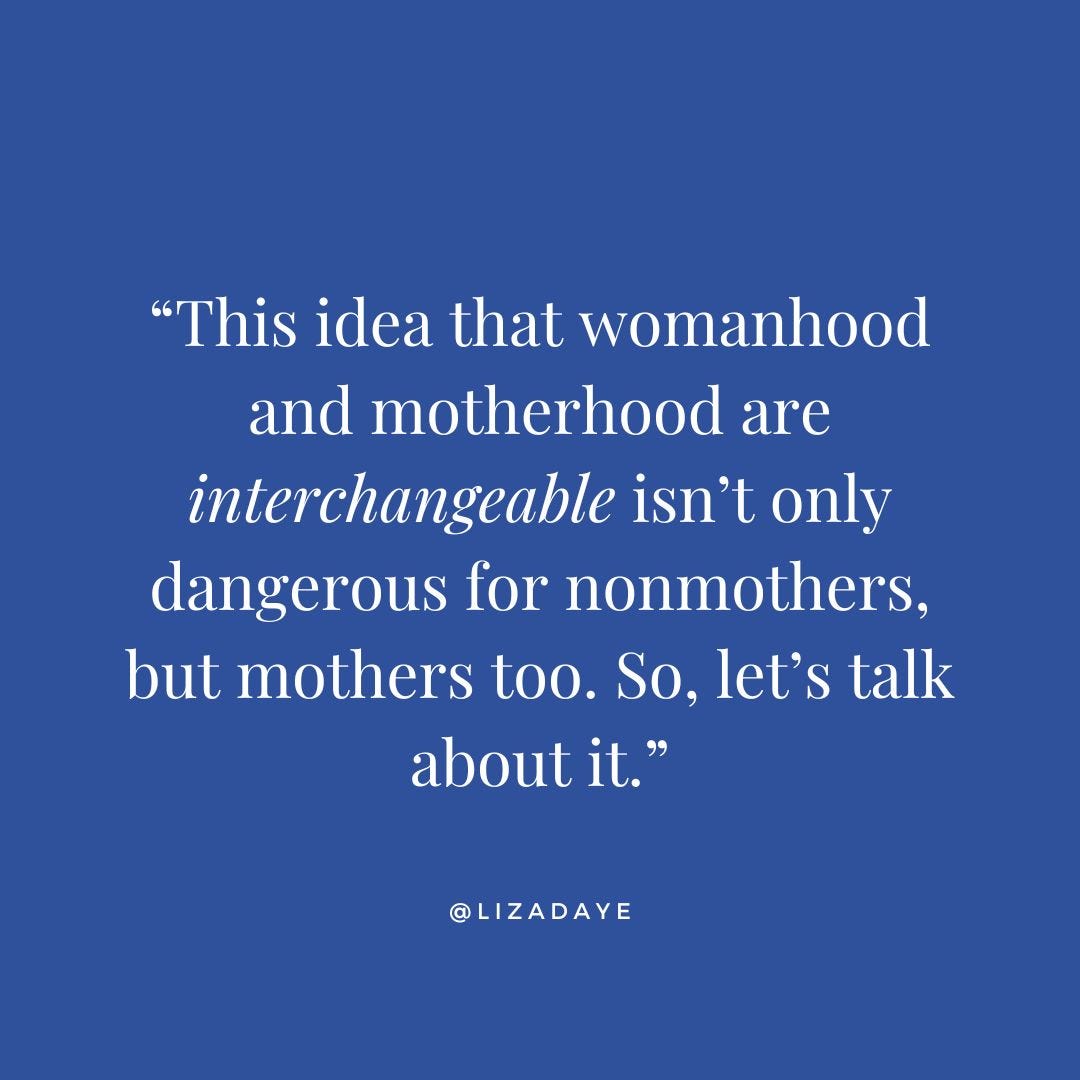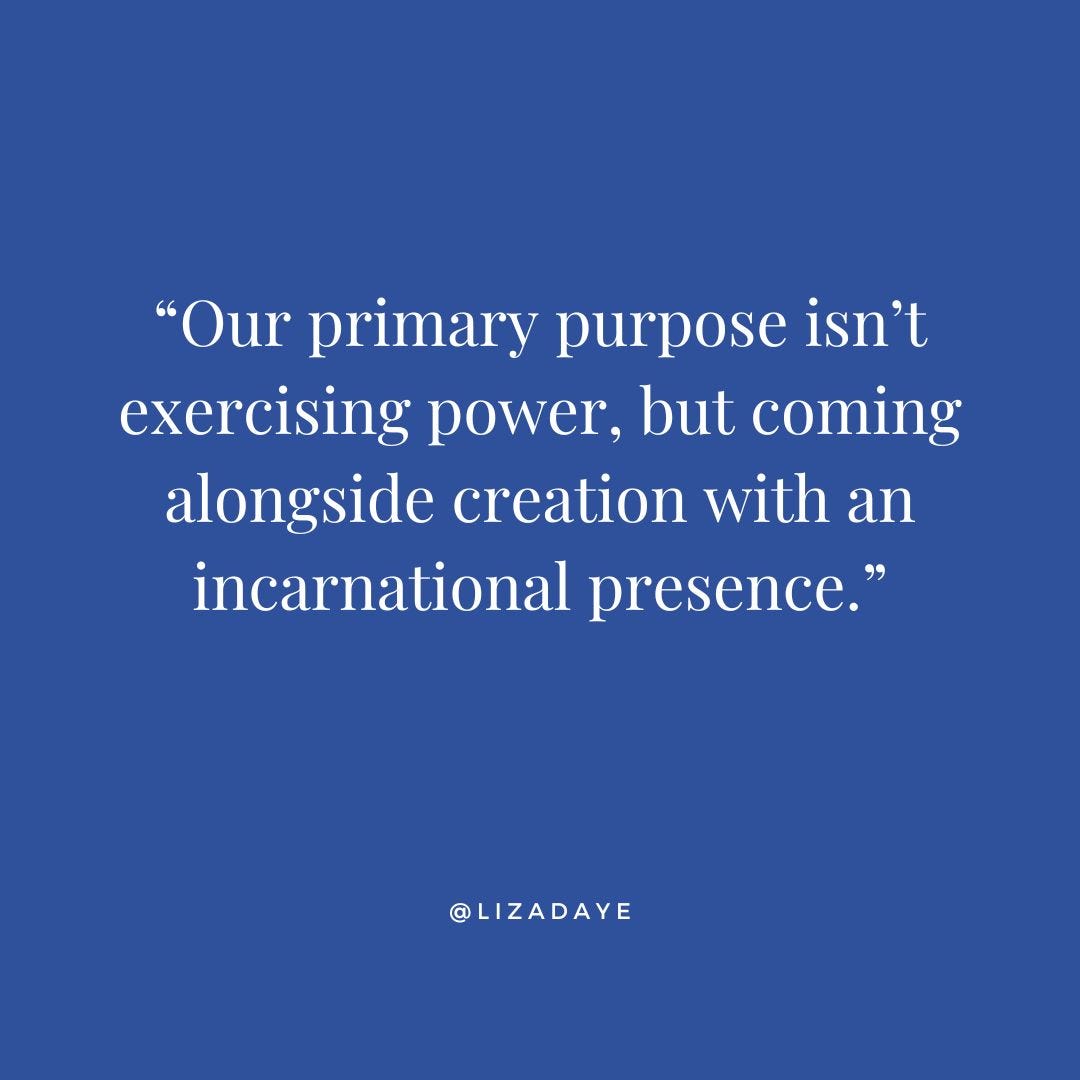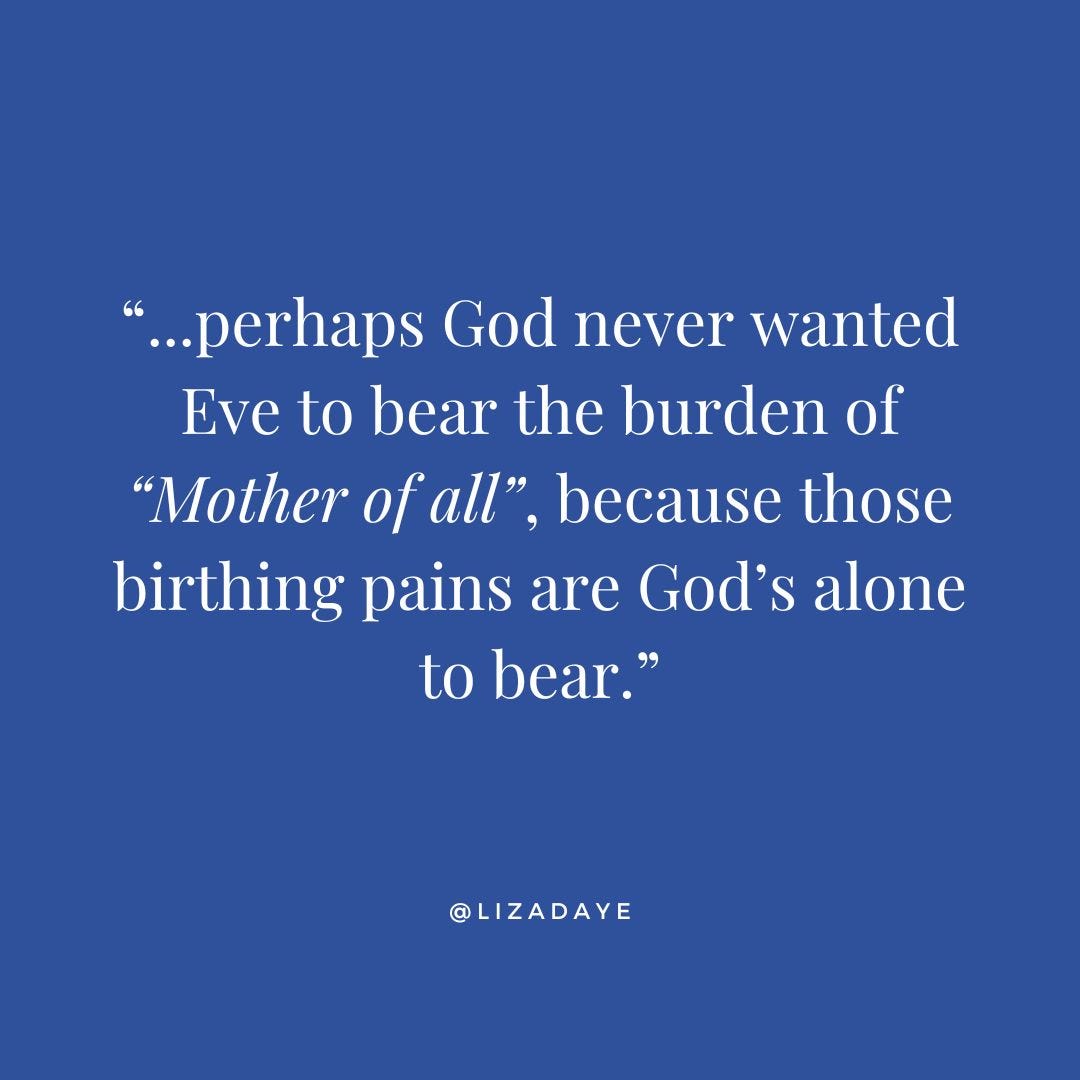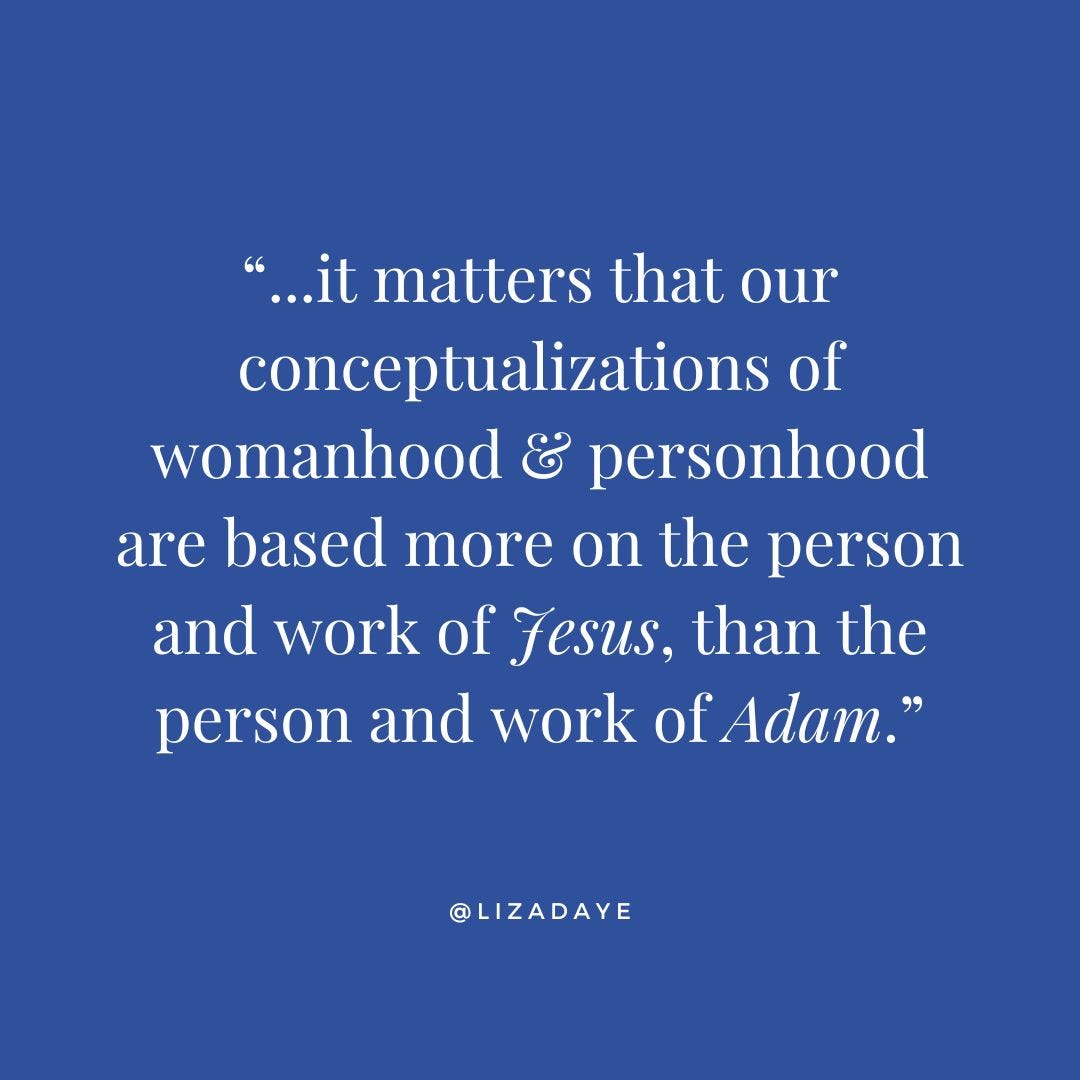This post is for the women, even the mothers, that secretly loathe Mother’s Day. And I’m posting this on purpose now because yesterday I spent a good portion of the day listening to women who shared that they either felt unheard, misunderstood, taken for granted, or invisible on a variety of different levels. From nonmothers who received roses at church, forced to grit and bare their teeth without breaking down, to friends whose babies are in heaven, to widows whose pastors hailed them as “spiritual mothers….” only to leave them feeling even more lonely. But this idea that womanhood and motherhood are interchangeable isn’t only dangerous for nonmothers, but mothers too. So, let’s talk about it.
First, one thing I want to give readers right now is permission to be honest rather than dismissive of their own feelings. And maybe none of this resonates, which is totally fine. Not everything is for everyone. But if it does, if the weird weight of mothering the world feels too heavy, maybe that’s because it is. So, as we regularly do here, lets revisit weird stories in scripture with new eyes, ask thoughtful questions, and ponder the implications. And since we have a lot of new friends here (yay!) my name is Liz. I’m a hospital chaplain in training, teacher, caregiver mom, and disability theologian. I love making space for honest faith and big questions because faith and wonder go hand in hand. So, let’s start in the beginning.
“Bone of my bones, flesh of my flesh”
In Genesis, we encounter a God that creates humankind in the context of harmonious relationship. Part of that harmony includes God entrusting Adam with the responsibility of naming the animals. Some theologies priorities the language of ruling and subduing here, But I prefer the idea of cultivating and caretaking. In John Dyer’s From the Garden to the City, he points out that the text in Gen 2 literally reads “there’s no adam for the adama,” because the Hebrew word for ground (adama) is a wordplay highlighting the relationship between humanity and creation within the created order. This matters because as image bearers, our primary purpose isn’t exercising power, but coming alongside creation with an incarnational presence. And later, when God creates the woman, the poetic language Adam uses to comfort the newly formed person is language of solidarity and belonging, “bone of my bones, and flesh of my flesh.”
Now, once sin enters into the world, it’s no secret that Adam is quick to play the blame game and throw Eve under the bus. But post-fall, post-curse, we see an even more dramatic change in Adam that raises alarm bells. Following God’s announcement of the consequences of sin (Gen 316-19), it seems as though Adam’s immediate response is to curse her. Because Adam, who God previously entrusted with naming only the animals, has the audacity to rename Eve. Some scholars have suggested that this re-naming is one of the first instances of abuse cited in scripture, as Adam transitions from the language of solidarity and belonging to “I’ll call you what I want.” In his renaming of her, he treats her the same way he treats animals, thus dehumanizing her.
The new name Adam gives Eve in Gen 3:20 means “Mother of All the Living.” Qualitatively honorific, at least on the surface, the matriarchal title evokes a sense of dignity, right? But I have to wonder how Eve might have interpreted the strange title, as a non-mother at the time. And while some commentators cite the possibility of Adam’s faith in the protoevangelium (Gen 3:15) to come to fruition through his wife’s womb, I can’t help but wonder what it would have meant for a man without an earthly mother to name a woman based only on what he derived qualitatively from the animals he also named. And when I think of Eve slowly realizing exactly how much of a weight it is to bear responsibility for mothering all of the living, I actually want to sob, because as a mother of four, I can hardly imagine the heaviness of that weight. It’s debilitating. Crushing. Isolating. Did Adam know? Was he acting out of manipulative cruelty? Bitterness? Or was that curse an accident? Does it matter? And what does it say about societal expectations both inside and outside of the church when motherhood becomes the defining aspect of womanhood?
And as we reflect on the relationship between the treatment of Eve in Genesis and the treatment of women today, I do think that one of the most oppressive pieces of patriarchy in general is the pressure women feel to mother not just our own children, but nations, generations, and entire population. Recently there’s been a good bit of chatter about the interview between Kamala Harris and Drew Barrymore where Drew suggests the vice president also take on a mothering role…. for the entire country. And while a good bit of the criticism stems from racist stereotypes from the civil war and reconstruction era, this example also illuminates just how prevalent this idea of mass motherhood really is. Because no one would dare suggest Joe Biden, Donald Trump, or any other world leader function as a national father figure. Even the fandoms of Taylor Swift and Lady Gaga respectively refer to them both with terms of maternal affection, and regularly compliment Swift with phrases like “Mother is Mothering.”
When I think about evangelical culture’s idolatry of motherhood in particular, and the ways in which we hierarchicalize value based on who we birth or how many bodies we birth and how able bodied those bodies are, I think it matters that we consider the idea that perhaps God never wanted Eve to bear the burden of “Mother of all”, because those birthing pains are God’s alone to bear. And I wonder if in allowing our Creator to mother us we might also untangle ourselves from the ways in which patriarchy has contorted flawed conceptualizations of motherhood and womanhood to rob women of belonging, solidarity, and shared power amongst the men who time and time again fail to acknowledge the invisible loads they place on us. If Christianity is supposed to be countercultural in nature, then why does its treatment of women seem so similar to that of dominant culture? Mother’s Day after all isn’t a Christian holiday, it’s a cultural one.
So, I’ll share with you, dear reader, a tender truth that another mothering friend shared with me recently: God sees. God loves the women that God made in God’s image. And rather than allowing Adam or any other man to name God, God entrusted Hagar, a marginalized abused woman to be the first to name God. El Roi, “The God Who Sees.”
There is a relationship in scripture between naming and empowerment. And for women who feel weighed down by bearing more than their fair share, I just want you to know that God sees.
God sees Eve.
God sees Hagar.
And God sees you and me.
God sees the invisible burden, the unintended consequences.
God sees the pressure that he didn’t place there, and he’d like to take it. And I think an important part of imagining how to belong to one another better includes reminding all of us that God made all women in God’s own image. Motherhood is a gift, but it isn’t an ideal, and it certainly isn’t an ideal for all women. And we need to be cognizant of the ways that certain flavors of evangelicalism use motherhood as a weapon to subjugate women and create hierarchies that distract from the mission of the church. If our purpose as image bearers is to image God harmoniously through the interconnected and interdependent relationships that exist between God, humankind, and creation, then how we belong to one another matters. And it matters that our conceptualizations of womanhood and personhood are based more on the person and work of Jesus, than the person and work of Adam.
And to my sisters who remain exhausted in a post-Mother’s Day haze and are struggling with comparison and even grief, I just want to remind you that the idols we’ve fashioned and the hierarchies we’ve erected are not God’s design for women. I hope that in naming some of the ambiguity you’ll begin to see yourself how God sees you, a woman who is worthy of real dignity, and honor every damn day. And I hope that whether you’re a mother with an overflowing plate or you’re not a mother at all (but you wrestle with mixed feelings regarding the overwhelming expectation to function as a mother due to your womanhood) that you remember you are seen and loved by the God who birthed you into existence. That God empowers women to boldly name the divine and prophesy about an eschatological future where God alone will mother all the living, and men and women will once again live in harmony with creation. Praise God.
As always, thank you for being here and supporting my writing and work. I LOVE making space for people to ask brave questions of the text, interact with scripture in community, and wrestle with the hard parts. I’m also a proponent of ensuring theology and scripture are accessible in ways that actually serve the church, especially the most vulnerable. If you want to be a part of that too, then help me by making sure you’re subscribed to this space, share any thoughts or questions, and comment below.
Blessings <3
Liz








I needed this more than I can bring words to right now, so thank you, Liz, for this reframe for all of us.
😭💙🙏 thank you for reading.